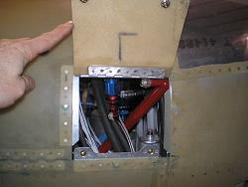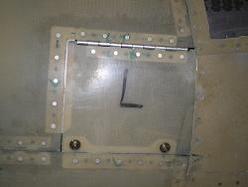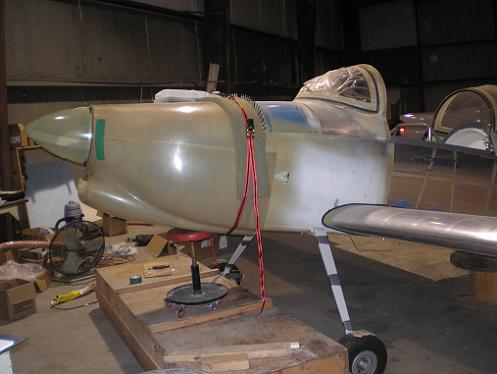

Fiberglass Cowling
Fitting the fiberglass cowling was not as hard as I was dreading. It did take a lot of time, and installing and removing the bottom cowling by myself wasn’t fun. But with a little patience, I ended up with a pretty good fit. I started by making the marks aft of the firewall, just like the directions say. I also made a mark for the center of the top of the fuselage. After I had the spinner backing plate temporarily installed, I clamped the front of the top cowl into place. I used spacers between the backing plate and the front of the cowl, and c-clamps to hold it in position. I then marked the middle of the aft end so I could align it with the center of the fuselage. And transferred the marks for the firewall. Instead of removing and having to re-clamp the top cowling, I used a 2x4 block to raise the aft end up off the fuselage. This allowed me to trim and sand with the cowl still in place. I made the initial cut, then removed the 2x4 to check the fit, marked where I needed to sand, inserted the 2x4, and sanded. I repeated this process until I had a good fit between the top cowling and the fuselage. Then I drilled and clecoed the top cowling to the firewall hinge. I temporarily held the lower cowl up to see how much overlap I had for the seam between the top and bottom cowlings. My fiberglass cowling was flush at the front, but overlapped by about two inches at the firewall. So I knew I had some room to trim either the top or bottom cowl to get the line looking the way I wanted. The bottom of the top cowling was aligned horizontally with the main axes in the in-flight position. So all I needed to do was clean it up. I used a thin aluminum strip with a straight edge to mark the bottom. Then sanded it until I had a straight line. With the top cowling installed, I placed the bottom cowl into position as best I could. Because the sides overlapped with the top, I couldn’t make it perfectly to start. I aligned the front and held it in place with duct tape. I then wrapped a strap around the aft end to pull it up into position. I had one side out of the top cowl, and the other inside the top cowl. I started trimming on the bottom side of the cowling. I trimmed only enough to go around the curves of the firewall. Again I trimmed a little, fit it, sanded, and refitted. It was a pain removing and installing the cowling every time, but it was the only way to get a good fit. I realized the front of the lower cowling was a little too far forward, so I trimmed a little off the back edge. Then I noticed the bottom wasn’t fitting flush (up and down) with the belly of the fuselage, so I trimmed a little off the tops. I went on in this fashion until I was happy with the fit all the way around. I finally drilled the rest of the hinges onto the firewall and the hinges to connect the top and bottom halves. Hinges and Doors
 I
found installing the hinges and access doors to be
very straightforward. I
did find that
after everything was riveted together, I had trouble getting the hinge
pins all
the way into the hinges holding the halves together.
I ended up having to sand a little off the
lips of the halves at some spots to get them to fit.
I did this by removing the hinge pin so I
could pull the halves apart a little.
Then I folded a piece of sandpaper in half and
slipped it between the
cowling halves. I
found installing the hinges and access doors to be
very straightforward. I
did find that
after everything was riveted together, I had trouble getting the hinge
pins all
the way into the hinges holding the halves together.
I ended up having to sand a little off the
lips of the halves at some spots to get them to fit.
I did this by removing the hinge pin so I
could pull the halves apart a little.
Then I folded a piece of sandpaper in half and
slipped it between the
cowling halves.  I
sanded back and forth
a little until that spot of sandpaper was worn out.
Then I refolded it a little farther up the
page and sanded again. After
a few
tries, I had a uniform gap along the seam, and the hinge pins fit in
nicely. I
sanded back and forth
a little until that spot of sandpaper was worn out.
Then I refolded it a little farther up the
page and sanded again. After
a few
tries, I had a uniform gap along the seam, and the hinge pins fit in
nicely.
Return from Fiberglass Cowling to Finishing Kit, or to Fiberglass Return from Fiberglass Cowling to Kit Plane Advice Home |
